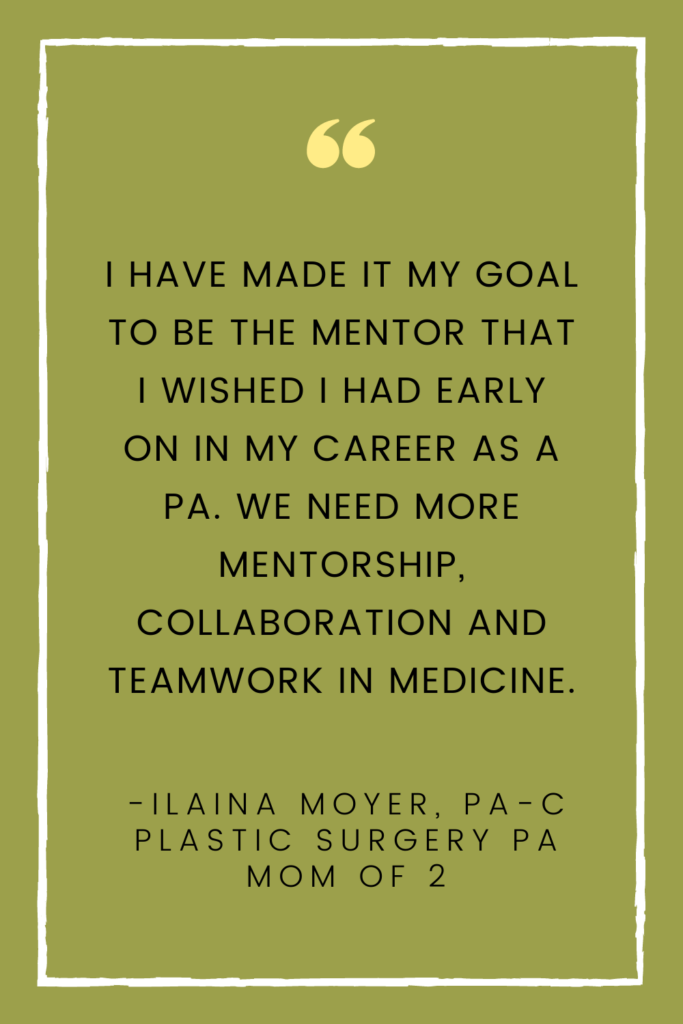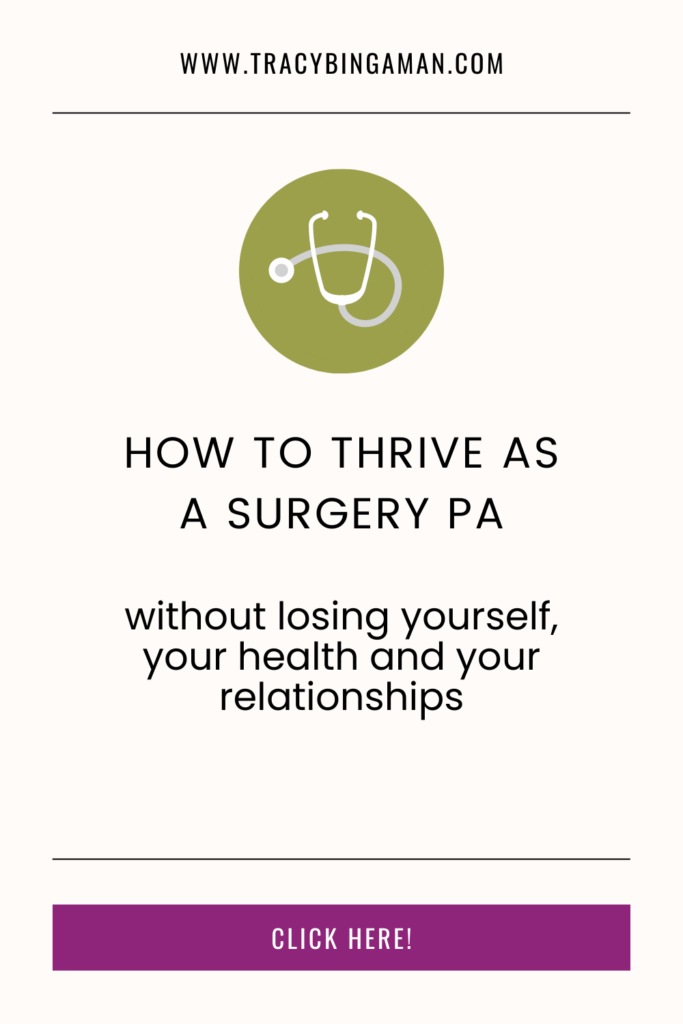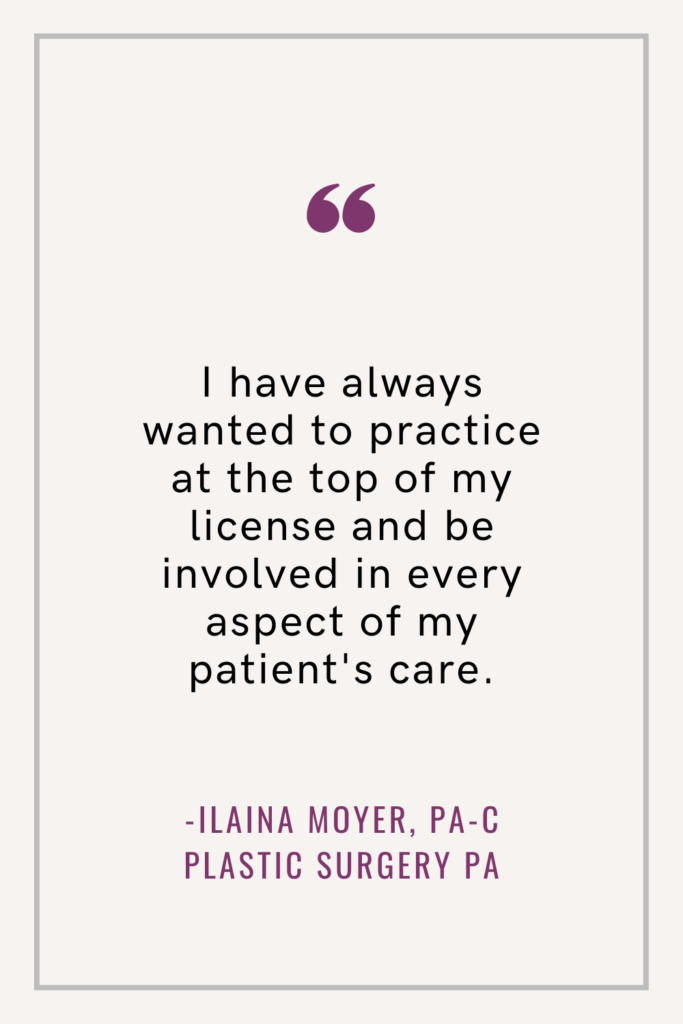Meet Ilaina Moyer, PA-C
Ilaina Moyer, a PA for the last 17 years, has spent the majority of her time practicing clinically as a physician assistant in the emergency department and as a plastic surgery PA. She took a quite jaunt through academia and rheumatology before settling into her leadership position in plastic surgery. A believer in work-life flow (not that balance bullshit), Ilaina offers a unique view of what we need to do to revamp the culture of medicine and how to thrive.
Watch the Video

Mentorship in Medicine
When searching for a mentor, the first step is to identify your core values. Taking the time to determine what matters most to you so that you can determine who and what you want to emulate and embody in your life and career is key. I share my 3-step process to identify your core values here.
Then, using those values, look around and find someone who embodies one or all of those values. Keep an eye out for mentors who have different letters after their name. Your mentor can be a resident, medical student, nurse practitioner, or your collaborating physician. Yep, even an NP. See my thoughts on a new mindset shift about the PAs vs. NPs debate here.
It doesn’t have to be one mentor that is the be all and end all mentor. Your mentors can be more like a board of directors who you consult or think “what would these folks do” when facing a decision.
Medical Community of Collaboration
Becoming a mentor helps to build this community of collaboration we are hungry for in medicine. Medicine has a culture of hierarchy, of “I lived through it so you have to, too.” and we are long overdue to change that mindset.
If everyone reading this post or listening to this episode or watching this youtube video leaned into being the mentor they wish they had, we can change the face of medicine. You can change the culture of your workplace. Heck, you can change the culture of the healthcare system at large.
If you don’t have this community of collaboration at your workplace, here’s Ilaina’s advice. First, find support that isn’t competitive outside your workplace. She did this when working in rheumatology by joining a patient support group for a specific disease process that interested her.
You can also join a hospital-wide committee or lean on your PA school alumni and classmates who you attended PA school with. Medicine can feel isolating, and leaning into this networking can make you feel less alone.
Advice for New Graduates
Do not be scared. Actually, go ahead and be scared, but do the things that scare you. Use this beginning part of your career as an opportunity to be a sponge, learn as much as you can, give things a try and do #allthethings.
Say yes to leadership positions, new opportunities, risky roles and even performing procedures. The beginning part of your career is a beautiful opportunity to grow.
Be OK with failures and having things not go well, but don’t accept defeat in your career when moves don’t work out or don’t pan out. Career paths are not linear. Try and try again.
As you grow in your career, your career and life goals will shift as your season of life and core values develop and change over time. Sometimes getting that dream job, crafting the proposal, making the change, you have to try and try again.
Proactive Career Moves in Medicine
Continuously ask yourself what is your next move, shift or change in your career. Long gone are the years where we work at the same position for 30-years and retire with a pension.
Normal is making shifts within your organization, within your position, stepping into leadership, shifting even inside of your department. This is the new “normal” for career patients.
Iliana reminds us that your career can be fluid. Continue to keep your eyes and ears open for opportunities to shift, change, do more or even do less.
Medicine Work-Life Flow
Ya’ll know that I think work-life balance is bullshit. Didn’t know that? Peep this post here.
During her interview Iliana endorsed work-life flow. That things can be fluid and in flux. That fluctuations in life and work are normal. That a 50/50 split between work and life is unreasonable.
Work-life balance is a myth. Stop aiming for this balance metaphor of one foot on either side of a seesaw that is perfectly balanced, set it stone, without movement.
Lean into the flow that there are seasons where you will work more and some where you will want to work less. When kids come along and you are juggling more demands from home and still wanting to lean in at work, there is a way to embrace the flow.
Embrace the fact that you cannot control all the factors and be resilient anyway. Aim for flexibility and acknowledge the unpredictability that is both life and working in surgery.
If you are looking to learn more about my specific experience working in surgery, check out my story of how networking shaped my career here and these 10 things I learned working 10 years in the OR.
Pin for Later





